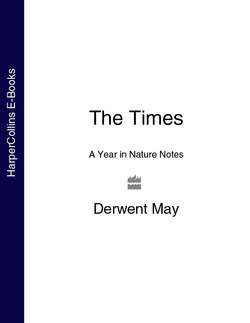Читать книгу The Times A Year in Nature Notes - Derwent May - Страница 11
6th January
ОглавлениеSNOW ON THE grass in parks and gardens sends blackbirds, song thrushes and robins under the hedges to look for food. The blackbirds are particularly noisy as they hop about on the dry leaves, and turn them over to look for insects lurking beneath them.
Larger birds such as carrion crows and magpies venture out onto pasture and playing fields if the snow is not too deep, and poke about in it. Birds that feed mainly in trees, such as blue tits and great tits, are affected only if the frost is severe enough to coat the twigs and branches with ice. This makes it much harder for them to get at the small insects and the moth eggs that they normally consume in large quantities. Bird tables and hanging peanut feeders become popular, and in the past year or two long-tailed tits have learnt the trick and started to visit them in hard weather.
All birds puff out their feathers in freezing weather, to insulate themselves with a layer of air and so keep warm. The poet Robert Graves observed that ‘puffed up feather and fearless approach’ indicated hunger in birds, but that in man these signs revealed ‘belly filled full’.
